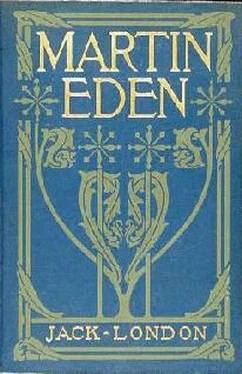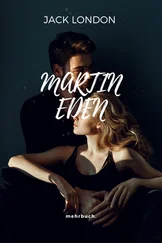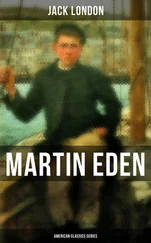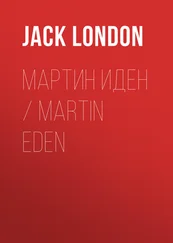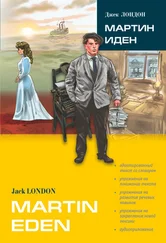Martin laughed. "I suppose your next advice will be to submit it to the magazines."
"By all means no-that is, if you want to see it in print. Offer it to the first-class houses. Some publisher’s reader may be mad enough or drunk enough to report favorably on it. You’ve read the books. The meat of them has been transmuted in the alembic of Martin Eden’s mind and poured into ‘The Shame of the Sun,’ and one day Martin Eden will be famous, and not the least of his fame will rest upon that work. So you must get a publisher for it-the sooner the better."
Brissenden went home late that night; and just as he mounted the first step of the car, he swung suddenly back on Martin and thrust into his hand a small, tightly crumpled wad of paper.
"Here, take this," he said. "I was out to the races to-day, and I had the right dope."
The bell clanged and the car pulled out, leaving Martin wondering as to the nature of the crinkly, greasy wad he clutched in his hand. Back in his room he unrolled it and found a hundred-dollar bill.
He did not scruple to use it. He knew his friend had always plenty of money, and he knew also, with profound certitude, that his success would enable him to repay it. In the morning he paid every bill, gave Maria three months’ advance on the room, and redeemed every pledge at the pawnshop. Next he bought Marian’s wedding present, and simpler presents, suitable to Christmas, for Ruth and Gertrude. And finally, on the balance remaining to him, he herded the whole Silva tribe down into Oakland. He was a winter late in redeeming his promise, but redeemed it was, for the last, least Silva got a pair of shoes, as well as Maria herself. Also, there were horns, and dolls, and toys of various sorts, and parcels and bundles of candies and nuts that filled the arms of all the Silvas to overflowing.
It was with this extraordinary procession trooping at his and Maria’s heels into a confectioner’s in quest if the biggest candy-cane ever made, that he encountered Ruth and her mother. Mrs. Morse was shocked. Even Ruth was hurt, for she had some regard for appearances, and her lover, cheek by jowl with Maria, at the head of that army of Portuguese ragamuffins, was not a pretty sight. But it was not that which hurt so much as what she took to be his lack of pride and self-respect. Further, and keenest of all, she read into the incident the impossibility of his living down his working-class origin. There was stigma enough in the fact of it, but shamelessly to flaunt it in the face of the world-her world-was going too far. Though her engagement to Martin had been kept secret, their long intimacy had not been unproductive of gossip; and in the shop, glancing covertly at her lover and his following, had been several of her acquaintances. She lacked the easy largeness of Martin and could not rise superior to her environment. She had been hurt to the quick, and her sensitive nature was quivering with the shame of it. So it was, when Martin arrived later in the day, that he kept her present in his breast-pocket, deferring the giving of it to a more propitious occasion. Ruth in tears-passionate, angry tears-was a revelation to him. The spectacle of her suffering convinced him that he had been a brute, yet in the soul of him he could not see how nor why. It never entered his head to be ashamed of those he knew, and to take the Silvas out to a Christmas treat could in no way, so it seemed to him, show lack of consideration for Ruth. On the other hand, he did see Ruth’s point of view, after she had explained it; and he looked upon it as a feminine weakness, such as afflicted all women and the best of women.
"Come on,-I’ll show you the real dirt," Brissenden said to him, one evening in January.
They had dined together in San Francisco, and were at the Ferry Building, returning to Oakland, when the whim came to him to show Martin the "real dirt." He turned and fled across the water-front, a meagre shadow in a flapping overcoat, with Martin straining to keep up with him. At a wholesale liquor store he bought two gallon-demijohns of old port, and with one in each hand boarded a Mission Street car, Martin at his heels burdened with several quart-bottles of whiskey.
If Ruth could see me now, was his thought, while he wondered as to what constituted the real dirt.
"Maybe nobody will be there," Brissenden said, when they dismounted and plunged off to the right into the heart of the working-class ghetto, south of Market Street. "In which case you’ll miss what you’ve been looking for so long."
"And what the deuce is that?" Martin asked.
"Men, intelligent men, and not the gibbering nonentities I found you consorting with in that trader’s den. You read the books and you found yourself all alone. Well, I’m going to show you to-night some other men who’ve read the books, so that you won’t be lonely any more."
"Not that I bother my head about their everlasting discussions," he said at the end of a block. "I’m not interested in book philosophy. But you’ll find these fellows intelligences and not bourgeois swine. But watch out, they’ll talk an arm off of you on any subject under the sun."
"Hope Norton’s there," he panted a little later, resisting Martin’s effort to relieve him of the two demijohns. "Norton’s an idealist-a Harvard man. Prodigious memory. Idealism led him to philosophic anarchy, and his family threw him off. Father’s a railroad president and many times millionnaire, but the son’s starving in ’Frisco, editing an anarchist sheet for twenty-five a month."
Martin was little acquainted in San Francisco, and not at all south of Market; so he had no idea of where he was being led.
"Go ahead," he said; "tell me about them beforehand. What do they do for a living? How do they happen to be here?"
"Hope Hamilton’s there." Brissenden paused and rested his hands. "Strawn-Hamilton’s his name-hyphenated, you know-comes of old Southern stock. He’s a tramp-laziest man I ever knew, though he’s clerking, or trying to, in a socialist coцperative store for six dollars a week. But he’s a confirmed hobo. Tramped into town. I’ve seen him sit all day on a bench and never a bite pass his lips, and in the evening, when I invited him to dinner-restaurant two blocks away-have him say, ‘Too much trouble, old man. Buy me a package of cigarettes instead.’ He was a Spencerian like you till Kreis turned him to materialistic monism. I’ll start him on monism if I can. Norton’s another monist-only he affirms naught but spirit. He can give Kreis and Hamilton all they want, too."
"Who is Kreis?" Martin asked.
"His rooms we’re going to. One time professor-fired from university-usual story. A mind like a steel trap. Makes his living any old way. I know he’s been a street fakir when he was down. Unscrupulous. Rob a corpse of a shroud-anything. Difference between him-and the bourgeoisie is that he robs without illusion. He’ll talk Nietzsche, or Schopenhauer, or Kant, or anything, but the only thing in this world, not excepting Mary, that he really cares for, is his monism. Haeckel is his little tin god. The only way to insult him is to take a slap at Haeckel."
"Here’s the hang-out." Brissenden rested his demijohn at the upstairs entrance, preliminary to the climb. It was the usual two-story corner building, with a saloon and grocery underneath. "The gang lives here-got the whole upstairs to themselves. But Kreis is the only one who has two rooms. Come on."
No lights burned in the upper hall, but Brissenden threaded the utter blackness like a familiar ghost. He stopped to speak to Martin.
"There’s one fellow-Stevens-a theosophist. Makes a pretty tangle when he gets going. Just now he’s dish-washer in a restaurant. Likes a good cigar. I’ve seen him eat in a ten-cent hash-house and pay fifty cents for the cigar he smoked afterward. I’ve got a couple in my pocket for him, if he shows up."
Читать дальше
